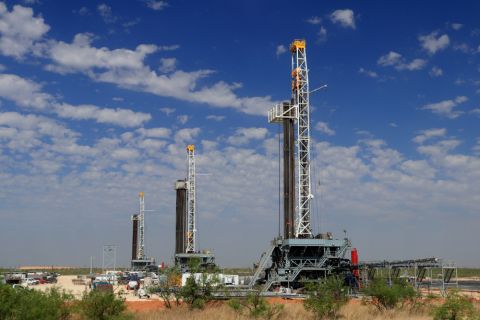WASHINGTON—The Trump administration’s infrastructure proposal released on Feb. 12 would speed up the permitting of U.S. natural gas pipelines, including by cutting Congress out of the process for allowing them to cross national parks.
The proposal fits into President Donald Trump’s broader plan to boost U.S. oil and gas development by slashing red tape, something that has cheered industry but raised concerns among environmentalists and Democratic lawmakers.
“At its core the proposal plans to steamroll as many projects to get to yes as fast as possible whether or not there is a robust environmental review,” said Brett Hartl, government affairs director of the Center for Biological Diversity.
The $1.5 trillion infrastructure proposal would give the interior secretary the authority to approve natural gas pipelines that cross the country’s national parks, changing the requirement that Congress authorize such projects.
The plan also aims to speed up the time that a state has to issue water permits—“section 401” certificates required under the federal Clean Water Act—needed for the construction of interstate natural gas pipelines.
The changes would deliver “projects in a less costly and more time effective manner by creating a new, expedited structure for environmental reviews and delegating more decision-making to States and enhancing coordination between State and Federal reviews,” the proposal says.
The proposals are part of a larger infrastructure plan designed to encourage spending on improvements by states, localities and private investors but which faces an uphill battle in Congress.
The Trump administration is seeking to tackle what it calls a duplicative environmental review process for major infrastructure projects by trying to amend bedrock environmental laws like the decades-old National Environmental Policy Act, Clean Water Act and Clean Air Act.
The administration said it wanted environmental reviews for major projects to take no longer than 21 months—instead of years in many cases—and direct one federal agency rather than several different agencies to conduct the review.
The changes could have significant impact on the permitting process for pipelines, including in places where there has been significant public opposition like the U.S. Northeast.
New York state, for example, has denied section 401 certificates for the Constitution Pipeline interstate natural gas pipeline and slowed down the process to issue a certificate for the Millennium Pipeline project, putting the state at odds with the Federal Energy Regulatory Commission.
Permit delays or denials for pipelines are a longtime frustration of oil and gas companies that are required to spend money on legal fees to challenge states that oppose them.
Recommended Reading
Comstock Continues Wildcatting, Drops Two Legacy Haynesville Rigs
2024-02-15 - The operator is dropping two of five rigs in its legacy East Texas and northwestern Louisiana play and continuing two north of Houston.
US Drillers Cut Most Oil Rigs in a Week Since November
2024-04-26 - The number of oil rigs fell by five to 506 this week, while gas rigs fell by one to 105, their lowest since December 2021.
TPH: Lower 48 to Shed Rigs Through 3Q Before Gas Plays Rebound
2024-03-13 - TPH&Co. analysis shows the Permian Basin will lose rigs near term, but as activity in gassy plays ticks up later this year, the Permian may be headed towards muted activity into 2025.
US Drillers Add Most Oil, Gas Rigs in a Week Since September
2024-03-15 - The oil and gas rig count, an early indicator of future output, rose by seven to 629 in the week to March 15.
US Drillers Add Most Oil Rigs in a Week Since November
2024-02-23 - The oil and gas rig count rose by five to 626 in the week to Feb. 23


